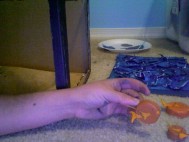Natalie Sanchez
11/5/10
Art – D2
I have always
been interested in the art that is in our natural world. I have always looked
at the environment around me and seen a piece of art. Right after I would get
home from a long ride, I would run directly to my room to sketch that red and
brown tree that I saw on my way, releasing withering leaves onto the front
window of my dad’s small and beat up Toyota. I would always enjoy drawing small doodles on the sides of
my paper whenever I was in class. I enjoyed the magical feeling of getting
paint on my hands and clothes. I would enjoy the black spots that my pencil tip
would leave on my index finger after an hour of vehement shading under the
shade of the gates shielding my backyards. I have always loved the feeling of
being an artist because with this new title came the right of depicting the
world the way that I see it with paints, pencil, or even clay. This is why I am
an artist.
In our art
class, we are collecting bottle caps in order to make bottle cap art. Our teacher,
Ms. Hull, was inspired to do this by Aurora Robson who builds sculptured out of
blown bottle caps. To mold the bottle caps, Aurora goes through a process of
melting the bottle caps and then blowing them up, like glass blowers blows up
glass. What is cool is that not only does Aurora use bottle caps to create art,
but she also uses bottles and other recyclable material.
Aurora holds a
pretty deep message with the art pieces that she creates; she is trying to
raise awareness of how important it is for us, Americans, to recycle. This is
why she uses only recyclable materials to build her sculptures and art pieces.
She uses bottle caps in her sculpture because, although bottles are recyclable,
bottle caps are not, so she uses them on her sculptures in order to reuse them
in a way that will bring out their beauty and value. She does not use spray
glue because of the contamination that it might add to the gases in the air and
she makes sure to make all of her artistic processes eco-friendly. Currently Aurora
Robson is working on an art piece that was in fact inspired by a recurring
nightmare she used to have as a child. She explained in an interview that, she
would frequently dream about being in a dark place surrounded by colorful blobs
that were the size of huge buildings compared to her size. She decided to build
a life-size mural of her dreams using bottle caps and bottles. She wanted to
make a different representation of her dream. She wanted to turn something that
was originally scary and unknown into something cool and beautiful.
Recently, in our
art class, we were assigned a task to create a piece of art made out of recyclable
material. This assignment was made to mirror the importance of recycling and
the value that recyclable material can have. As soon as I received this task, I
started thinking of a million different ways that I could go about this
assignment. My first idea was papier-mâché a basketball. After this I was going
to pain the ball with blue paint and then I was going to make the continents
out of scrunched up newspaper (to show a sort of topography on the “pieces of
land”). I was gong to later paint the “land” brown. Eventually I thought about
cardboard boxes. I was reminded of a fish tank. After this, I started planning
out what I would place inside of the fish tank. I thought about using newspaper
to build my huge fish and using play sand to form my base. I was going to use
plastic wrap to form my water in the background.
At the end, I
used a cardboard box to make my fish tank. I cut out the frame, then I painted
it a dark grey. Inside, I placed its sand. At the back, I attached its water,
which I created on a separate frame. I then wanted to make my fish out of
bottle tops, in order to make a stronger statement. In the end, I ended up with
a pretty sturdy fish tank. I am thinking of using a more adhesive glue, because
the paint that I used before is pealing off. Other than that, my project cam
out better than expected.
With this fish
tank, I was trying to show how important it is to collect bottle tops. My fish
tank represent a fish haven, but the fishes inside the tank are made out of
bottle tops. This represents the many fish that have died because of the caps
they have ingested. These bottle caps are tossed in the trash, which eventually
gets tossed into a body of water. This is where fish wind up eating these
un-recycled bottle tops, causing them to die, because of our negligence to
collect bottle caps and reuse them. This is what my fish tank represents. I
call it “Fish haven”.



